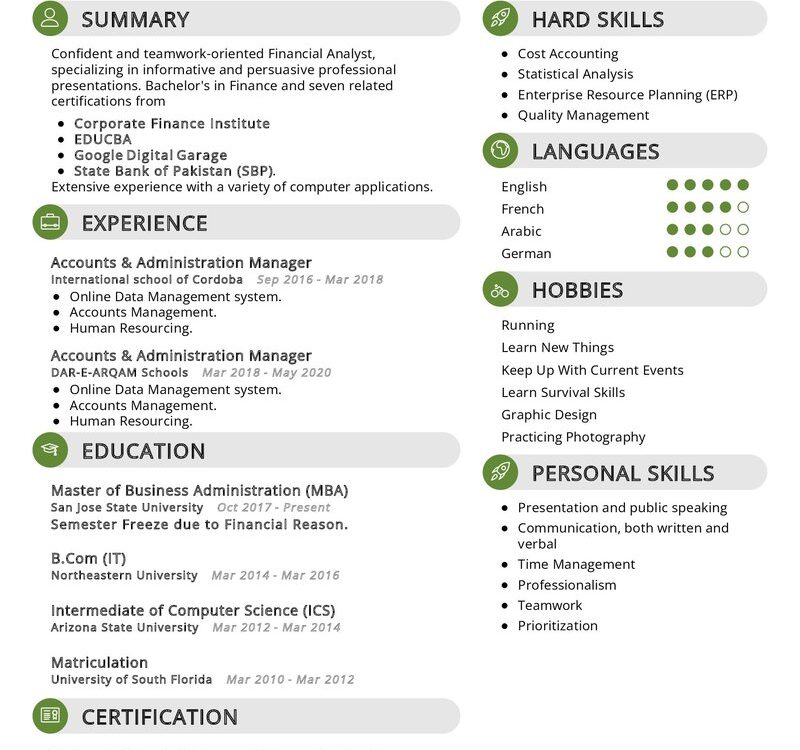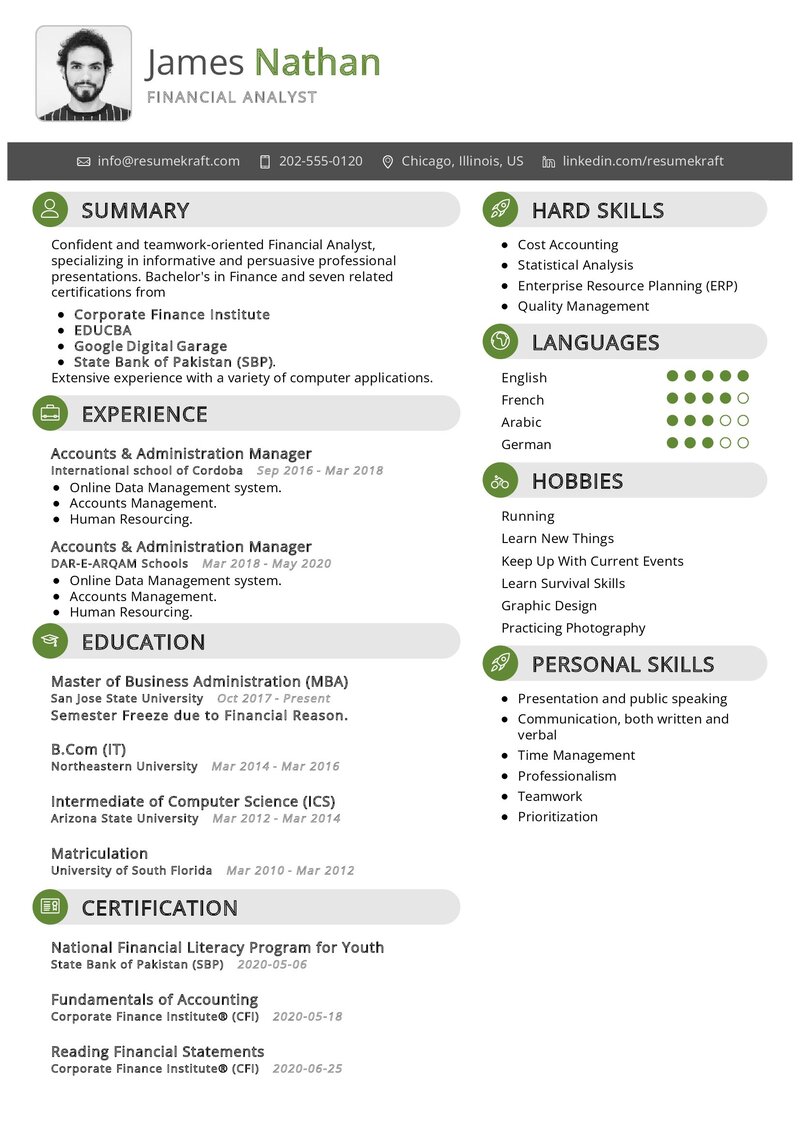What is the Role of a Financial Analyst?
The role of a Financial Analyst is crucial in today’s dynamic business environment, where meticulous financial planning and analysis are pivotal for the success of any organization. A Financial Analyst plays a multifaceted role, delving into the intricacies of financial data and market trends to provide valuable insights and guidance. Let’s explore the diverse responsibilities and skills that define the role of a Financial Analyst, a profession that demands a blend of analytical prowess, business acumen, and strategic thinking.
What are the Financial Analyst Job Requirements?
Stepping into the shoes of a Financial Analyst requires a solid foundation and a specific skill set that enables you to navigate the complexities of financial markets and data analysis. Let’s delve deeper into the prerequisites necessary to excel in the role of a Financial Analyst:
- A Bachelor’s or Master’s degree in Finance, Accounting, Economics, or a related field, showcasing a strong understanding of financial principles and practices.
- Proficiency in financial modeling and analysis, with a keen eye for interpreting financial data and market trends.
- Experience in financial planning, a journey that demonstrates your ability to create comprehensive financial strategies and forecasts.
- Strong analytical and problem-solving skills, honed through experiences and possibly through certifications and specialized training.
- Excellent communication and presentation skills, enabling you to convey complex financial information to various stakeholders effectively.
- Advanced knowledge of financial software and tools, essential for conducting in-depth financial analysis and generating comprehensive reports.
Obtaining additional certifications such as Chartered Financial Analyst (CFA) or Financial Risk Manager (FRM) can significantly enhance your profile and credibility in the competitive financial landscape.
What are the Responsibilities of a Financial Analyst?
The responsibilities of a Financial Analyst are diverse and far-reaching, encompassing tasks that range from financial planning and analysis to providing strategic recommendations for maximizing profitability and mitigating risks. Let’s explore the key responsibilities that define the role of a Financial Analyst:
- Conducting thorough financial analysis, including revenue, expense, and investment performance, to provide insights for informed decision-making.
- Developing financial models and forecasts, playing a pivotal role in strategic planning and resource allocation.
- Assessing market trends and economic indicators to provide recommendations for investment opportunities and risk management strategies.
- Preparing comprehensive financial reports and presentations for stakeholders, offering clear and concise summaries of complex financial data.
- Collaborating with cross-functional teams, including executives, department heads, and external stakeholders, to align financial strategies with organizational goals.
- Monitoring and evaluating financial performance metrics, identifying areas for improvement and implementing corrective measures when necessary.
- Staying updated with the latest financial regulations and compliance standards, ensuring adherence to legal and industry-specific requirements.
Each responsibility demands a keen understanding of financial intricacies and the ability to make informed decisions that contribute to the overall financial health of the organization.
Financial Analyst CV Writing Tips
As you embark on the journey to create a CV that stands out in the competitive job market, remember that your CV is a reflection of your skills, experiences, and career aspirations. Here are some tips to help you craft an effective Financial Analyst CV:
- Highlight your financial analysis skills, showcasing instances where your insights have contributed to the success of projects or financial decisions.
- Detail your experience with financial modeling, demonstrating your proficiency in analyzing complex financial data and forecasting future trends.
- Quantify your achievements, using metrics to showcase the impact of your financial strategies on the organization’s growth and profitability.
- List relevant certifications and training programs, underscoring your commitment to continuous learning and professional development.
- Customize your CV for each application, aligning your skills and experiences with the specific requirements of the position.
Each tip serves as a valuable tool in crafting a compelling narrative that highlights your expertise and accomplishments in the field of financial analysis.
Financial Analyst CV Summary Examples
Your CV summary is the first glimpse of your professional journey, encapsulating your skills, experiences, and the value you bring to the table. Here are some examples to inspire you:
- “Detail-oriented Financial Analyst with a proven track record of providing accurate financial forecasts and strategic recommendations, contributing to a 15% increase in company profits over three fiscal years.”
- “Results-driven Financial Analyst adept at identifying investment opportunities and optimizing financial strategies, with a demonstrated history of successful portfolio management and risk assessment.”
- “Analytical Financial Analyst with a strong background in market research and economic analysis, proficient in developing comprehensive financial models that drive informed business decisions.”
Each summary serves as a snapshot of your professional achievements and your potential to contribute to the financial success of an organization.
Create a Strong Experience Section for Your Financial Analyst CV
Your experience section is the cornerstone of your CV, showcasing the depth of your expertise and the impact you have made throughout your career. Here are some examples to guide you:
- “Conducted in-depth financial analysis for multiple investment portfolios, resulting in a 25% increase in overall portfolio value within a two-year period.”
- “Led a cross-functional team in the development of a comprehensive financial forecasting model, enabling the company to make strategic investment decisions that led to a 10% increase in annual revenue.”
- “Collaborated with senior executives to assess and manage financial risks, implementing effective risk mitigation strategies that safeguarded the company’s financial interests during volatile market conditions.”
Each experience serves as a testament to your analytical abilities, strategic thinking, and your contributions to the financial success of your organization.
Sample Education Section for Your Financial Analyst CV
Your educational background is a cornerstone of your professional credibility, showcasing your academic achievements and your commitment to mastering the field of finance. Here’s how you can present your educational qualifications:
- Master of Business Administration (MBA) in Finance, XYZ Business School, a comprehensive program that provided in-depth knowledge and practical insights into financial management and investment analysis, 2016.
- Bachelor of Science in Economics, ABC University, an enriching academic journey that laid the foundation for understanding economic principles and their application in the business world, 2012.
- Chartered Financial Analyst (CFA) Certification, a globally recognized credential that validates your expertise in investment management and financial analysis, 2017.
Each educational milestone is a testament to your commitment to excellence and your dedication to continuous learning in the field of finance.
Financial Analyst Skills for Your CV
Your skill set is a powerful asset, showcasing your proficiency in various aspects of financial analysis and strategic planning. Let’s list down the essential skills that a Financial Analyst should possess:
Soft Skills:
- Analytical thinking, the ability to dissect complex financial data and derive meaningful insights.
- Attention to detail, the keenness to identify critical nuances in financial reports and market trends.
- Communication and presentation skills, the art of conveying complex financial information to diverse audiences effectively.
- Time management and organizational skills, the ability to prioritize tasks and meet tight deadlines in a fast-paced environment.
- Adaptability and resilience, the flexibility to navigate through market fluctuations and changing business landscapes.
Hard Skills:
- Proficiency in financial software, including Excel, Bloomberg Terminal, and financial modeling tools, enabling comprehensive financial analysis and reporting.
- Knowledge of financial regulations and compliance standards, ensuring adherence to legal requirements and industry best practices.
- Experience with financial statement analysis, a critical skill for evaluating the financial health and performance of organizations.
- Risk management expertise, the ability to assess and mitigate financial risks effectively to safeguard the organization’s interests.
- Investment analysis skills, enabling the evaluation of investment opportunities and the formulation of sound investment strategies.
Each skill serves as a pillar of strength, empowering you to make informed financial decisions and contribute to the growth and stability of your organization.
Common Mistakes to Avoid When Writing a Financial Analyst CV
As you craft your CV, it is crucial to avoid common pitfalls that can undermine your chances of landing your dream job. Here we list down the mistakes often seen in CVs and how to avoid them:
- Using generic statements that fail to highlight your specific achievements and contributions in previous roles.
- Neglecting to tailor your CV for each application, missing the opportunity to showcase your fit for the specific role and organization.
- Overwhelming your CV with excessive technical jargon, making it difficult for recruiters to grasp your core competencies and accomplishments.
- Omitting crucial details about your role and responsibilities, leaving gaps in your professional narrative that may raise questions for recruiters.
- Failing to proofread your CV thoroughly, leading to grammatical errors and formatting inconsistencies that can detract from your professional image.
Avoiding these mistakes can help you create a well-crafted CV that effectively communicates your skills, experiences, and potential as a Financial Analyst.
Key Points to Remember for Your Financial Analyst CV
As we come to the end of this comprehensive guide, let’s recap the key points to keep in mind while crafting your Financial Analyst CV:
- Emphasize your analytical prowess, showcasing your ability to dissect complex financial data and provide strategic insights.
- Highlight your proficiency in financial modeling, demonstrating your skills in forecasting and planning for the financial success of the organization.
- Showcase your contributions, quantifying your achievements and demonstrating the tangible impact of your financial strategies on the organization’s growth and profitability.
- Include a section on professional development, showcasing your commitment to continuous learning and staying updated with the latest trends and practices in the field of finance.
Finally, feel free to utilize resources like AI CV Builder, CV Design, CV Samples, CV Examples, CV Skills, CV Help, CV Synonyms, and Job Responsibilities to create a standout application and prepare for the Financial Analyst job interview.


